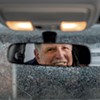Published February 21, 2007 at 5:00 p.m.
It's past midnight, your housemates are out of town, and you've just accidentally locked your only set of keys in your car. Who you gonna call? A quick scan of the Yellow Pages or a cellphone 411 will connect you with Les Koerner, a.k.a. "Mr. Keys." (You'll also find him under "A. Aaron," which offers an alphabetical advantage in the phone book.) Koerner is the only solo 24-hour locksmith in the Burlington area. For a fee, he'll get you rolling again.
The grizzle-haired, gruff, and articulate Koerner worked as a night locksmith in Manhattan for 20 years. "If the bad guys didn't break into a stuck car, the city would tow it in the morning, so people were always working with a timeline, with car lockouts," he says. He relocated five years ago, when Vermont's AAA branch office offered him an automotive locksmithing contract. He misses New York for its Jewish delis and all-night dining options, but doesn't mind the slower pace of work in the Green Mountains. "You're always the shining white knight," Koerner says. "I really enjoy my job."
SD: How did you become a locksmith?
LK: I was a part-time super in Brooklyn, and as a part-time super you put in locks. When I opened up The New York Times to look for a new job, there was a locksmith looking for an apprentice, and I called him.
SD: Has your work changed much since you started in Manhattan?
LK: Automotive has changed quite a bit. Automotive has a lot of transponders now, which are these hidden chips in your keys, like a radio transmitter. When you put the key in, an antenna powers up the chip in the key. It has to have the right digital input for the car to get fuel and to start. So even if you have the right mechanical key and you turn it, nothing will happen. People don't find out until they go to Wal-Mart to have a key made, and then wonder why it doesn't start their car. They call the dealer, and then find out that a transponder key costs $125, $150, or in some cases $400.
SD: What's the hardest part of your job?
LK: Keeping up with automotive locks, because they're constantly changing. The other stuff, not so much. Twenty years' experience in Manhattan is like 60 years elsewhere . . . In New York I [did night work] for many different locksmiths. Each shop had a specialty that nobody did as well, and I was privy to all of it, all their tricks. Different little secrets, like keeping a magnet over a key machine.
SD: What does that do?
LK: You stick the key blank up on the magnet before cutting a copy. If it sticks, it's steel, and you don't cut it, because if you cut the $3 key, you ruin your $85 cutter.
SD: How much do you charge?
LK: It varies from job to job and when people call. For a car opening during normal business hours, I charge $55. At four o'clock in the morning, it's $150. I answer the phone 24 hours, but that doesn't mean it's the same price, day or night!
SD: What's the most common lockout situation?
LK: A slamlock - where someone has a key and knob lock, and they go out and leave the key inside. Most commonly it's in South Burlington, on a fairly new house, where the people have just moved. Wherever they came from before, they had to unlock the door from the inside to turn the knob and get out. To lock it, you had to turn the knob again, which gave you the chance to make sure you had the key. These new homes in South Burlington have Schlage locks in them, which always open from the inside. They're better quality than whatever these people were used to, and when the outside is locked, they can still open from the inside. People are in the transitional stage [of learning that], and they lock themselves out.
SD: You're on call around the clock. What time of day do most calls come in?
LK: Most stuff in Burlington is during the day. People tend to lock themselves out when it's snowing or raining, because their minds are scattered. I seem to be getting all the night work, now. I don't know whether anyone ever did it before.
SD: What's the most unusual job you've ever done?
LK: Most of the interesting situations were in New York. Armored cars that [drivers] were locked out of because the locks malfunctioned - twice! I've had several situations where people were locked in bathrooms. One time in particular a woman was claustrophobic and very stressed.
SD: Do you have to make sure that the person who wants into a vehicle or other locked space is the property owner?
LK: If someone has left the keys inside and pulled the door shut, I don't question that much. If there's a deadbolt, then they have to come up with proof that they live there, because you had to have a key and lose it. Opening a car is no big deal, especially if the keys are inside. But if someone is trying to make a key for a car, and they don't have a key, I have to see the registration and the driver's license, and they have to match . . . Otherwise I have to make some phone calls.
SD: Is the profession regulated? Do you have to get a license or be certified?
LK: It depends on where. In Vermont, no. In most places, the state regulates it. New York City has had licensing since the '20s . . . it's very easy. Basically they make you get fingerprinted, and two other locksmiths have to vouch that you know what you're doing, and they check that you're not a convicted felon. That's it.
SD: How do you know which materials to bring when you get a call?
A lot of that is experience. On car lockouts, I have car-opening tools that I normally carry, but there are about four that I use predominantly, plus picks.
SD: Do you have any advice for ways people can avoid getting locked out?
LK: You should leave keys with trusted people. Also, I have an axiom: You should never have a lock on the door under your control that's not in 100 percent working order, or to which you do not have a key. Sooner or later it will lock you out or lock you in.
More By This Author
Speaking of Business
-

Vermont to Open $20 Million Business Flood Relief Fund
Jul 27, 2023 -

Video: Following Seven Days' Paper Trail to Québec
Jun 21, 2023 -

Rochester Grocery Store to Close, Leaving Residents in the Lurch
Apr 24, 2023 -

Video: Saying Goodbye to Burlington’s Penny Cluse Café
Nov 17, 2022 -

Essay: Natalie Miller Riffs on How Her Nightclub Survived the Pandemic
Sep 14, 2022 - More »
Comments
Comments are closed.
From 2014-2020, Seven Days allowed readers to comment on all stories posted on our website. While we've appreciated the suggestions and insights, right now Seven Days is prioritizing our core mission — producing high-quality, responsible local journalism — over moderating online debates between readers.
To criticize, correct or praise our reporting, please send us a letter to the editor or send us a tip. We’ll check it out and report the results.
Online comments may return when we have better tech tools for managing them. Thanks for reading.











































